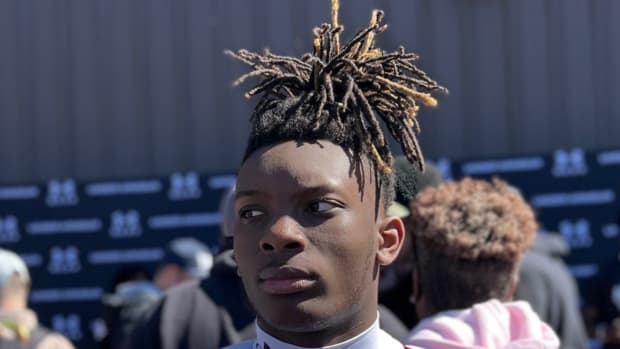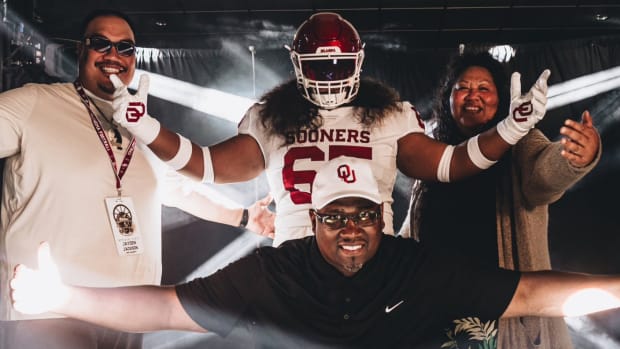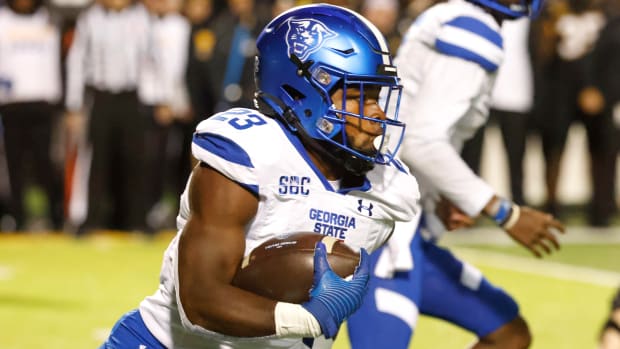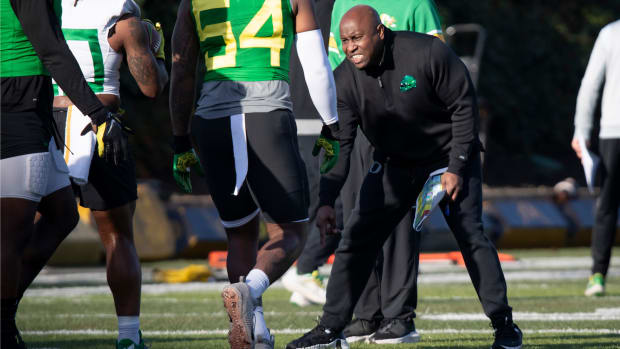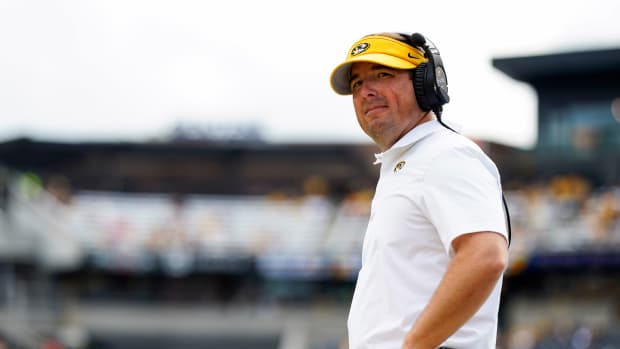Graham Harrell, the Air Raid and Clay Helton's All-in Gamble to Turn Around USC
LOS ANGELES — James Morton had this all planned out. He’d covertly bring Graham Harrell into Midland Lee High School for a quick interview, offer Harrell the offensive coordinator job on his staff and then quietly exit with the former Texas Tech quarterback without anyone noticing. What he didn’t expect is for one of his own football players to recognize Harrell in the school’s field house, snap a photo of him and post it on social media. “News stations,” Morton chuckles, “started calling.”
Harrell didn’t accept that job in 2014, because a day later, Mike Leach, learning of Harrell’s interest in coaching, offered him a gig on the staff at Washington State. That doesn’t mean Morton can’t imagine a world in which Harrell was his offensive coordinator—more points, more wins, more district titles, maybe a state championship—but the coach sees the glass half-full. Harrell is now recruiting Morton’s son, Behren, a 2021 quarterback prospect. “That’s the other side of it,” says Morton, now head coach at Eastland High, about 100 miles west of Fort Worth. “What if he did go into high school coaching? Then he never would have met Behren and my son wouldn’t have gotten an offer from USC.”
Five years after his coaching career nearly started at a small west Texas high school, Harrell is the offensive coordinator at one of college football’s crown jewels, USC. Inside a dark office and from behind his L-shaped desk, Harrell is explaining to a visitor the eyesore in the corner: a dirty blender, which is responsible for creating his breakfast each morning, a concoction that includes raw eggs, a scoop of protein powder and an entire cup of coffee. Items in Harrell’s office are windows into his life. For instance, resting on his mini refrigerator is a WWE wrestling belt he acquired backstage at a 2010 Smackdown event while a member of the Super Bowl champion Green Bay Packers. He’s such a big professional wrestling fan that one of the sport’s stars, Triple H, is the inspiration behind his 4-year-old son’s name: Herschel Hawk Harrell (H.H.H.).
Another item is positioned squarely in front of him. The leather-bound Holy Bible, he believes, is at least partially responsible for his father, Sam, walking upright today. Less than 10 years ago, Sam was forced to retire from coaching in his mid-50s, needed a walker to get around and, at times, couldn’t lift his left leg, the effects of multiple sclerosis. After stem cell treatments, Sam has returned to coaching, ditched that walker and has enough movement in his left leg that he jumps rope and rides bikes. “That was a miracle the Lord worked,” Graham Harrell says. “That’s dad’s story. It’s unbelievable.” His father’s story, as uplifting as it is, can wait. This is a story about his son, one of the fastest rising coaches in the sport. In his sixth year in the profession, he’s offensive coordinator at USC. “Talk about a great story,” Sam Harrell says. “I stop and think about that. He nearly took the Midland job and five years later, you turn around and say, ‘He’s at USC now?’ I can’t explain it.”
Graham Harrell is here to save Clay Helton’s job. Helton won’t say that and neither will Harrell, nor will anyone else inside the USC football program. And maybe we’re being a touch dramatic—to save his job, really? What we do know is that a 5–7 season in 2018 pushed Helton’s job security so close to the cliff that the offensive-minded coach is scrapping his own pro-style playbook, removing himself from schematics and taking the plunge into the pass-heavy spread world by hiring a 34-year old from Mike Leach’s Air Raid tree. “I really wanted to start with a clean slate,” Helton says from his office, two doors down from the one Harrell now occupies, the same one in which Kliff Kingsbury spent four weeks of December. Kingsbury’s abrupt departure to become the head coach of the Cardinals didn’t change Helton’s plan. He moved to the No. 2 on his list, a coach from the same Air Raid tree with a passing scheme that’s nearly identical to Kingsbury’s.
Why the Air Raid? For its simplicity more than anything else, Helton says. The root of the Trojans’ woes last year, particularly a season-ending three-game losing streak, was discipline and focus—turnovers, penalties, etc., Helton contends. “We had got so scheme oriented that we weren’t as good fundamentally.” Harrell’s offense contains a total of 12 pass concepts, and his playcalls are sometimes a single word in length. The thick pro-style playbook USC operated under last season—quarterback JT Daniels calls it an “encyclopedia”—included playcalls like “I-right G-short A-42-Tom Y-Shallow-X-in,” Helton says. And now? “We’ve gone from that to ‘Cross.’” It took Harrell just three days to install his offense this past spring. Now, the focus is perfecting it with repetition.
People hear Air Raid and they think five wide receivers, no tight ends, 60 pass attempts and 50 points a game. To Harrell, the Air Raid is something else. It is working to death a small number of plays, with shorter playcalls, perfecting those plays and out-executing—not out-scheming—the opponent. Option-based coaches, like former Georgia Tech coach Paul Johnson, operate under similar mentalities, but with a different focus: rushing the football. Leach does it through the air. “You can’t do everything. I think a lot of people try to take a little bit of everything offensively,” Harrell says. “If you do that, you don’t have much of an identity. You’re just O.K. at everything and not really good at something.”
USC’s performance in a 24–17 loss to third-ranked Notre Dame inspired Helton to make this offseason change. He installed a simple, pass-centric game plan against the third-ranked Irish that resulted in his offense’s best performance of the season. Had the Trojans not lost two first-half fumbles, they might very well have won. Daniels completed 37 of 51 passes for 349 yards operating a scheme similar to the one he’ll run in 2019. “He didn’t say before Notre Dame, ‘We’re running the Air Raid,’” Daniels says, “but he put in a lot of Air Raid-esq concepts.”
Helton is completely allowing Harrell to run the offense. The head coach will focus, instead of Xs and Os, on the fundamentals that doomed the Trojans last season. His eyes in practice will be on preventing and forcing turnovers, as well as discipline. Pac-12 officials patrolled the sideline of each of USC’s 15 spring practices, a first for Helton, he says. He’s instituted stricter punishments for flags, forcing a player to perform up-downs after committing a foul. Any personal foul sends the entire team into up-downs. The turnovers and penalties aside, the real key to success this season is Harrell and that offense. The pressure’s on, but that’s no thing for a kid who set or tied eight NCAA records as quarterback at Texas Tech, played one game with a fractured hand (he’s still got 18 steel pens in the hand), orchestrated the largest comeback in bowl history (2006 Insight) and took countless cussing sessions from Leach, as well as playing high school ball for his dad.
“Pressure’s never really been a big deal to him. When everybody else would get nervous, including me, he never seemed nervous,” says Sam Harrell, who coached Graham at Ennis High School, just south of Dallas. “He knows that if Coach Helton gets let go, he’s going to be out of a job too, but he knows that if they turn that thing around, it could turn into something huge—to have the players at USC and run this kind of offense. If they don’t, it’s still worth a shot.”
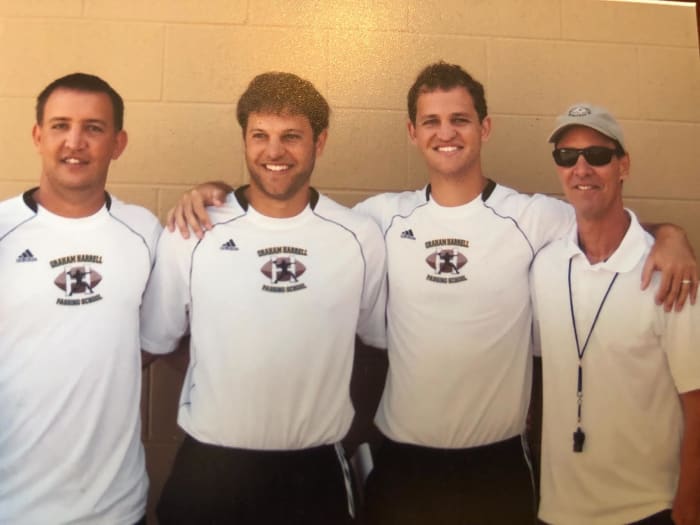
The four coaching members of the Harrell family are pictured here. Brothers Zac, Graham and Clark stand aside father Sam, to the far right.
Courtesy of the Harrell family
For nearly four years, Sam Harrell hid his disease from his three sons. Shortly after Graham graduated from Texas Tech in 2008, when Sam couldn’t hide his symptoms any longer—the unbalanced walking, the trouble with sight, his numb left leg—he delivered the news to Zac, Clark and Graham. The National MS Society describes multiple sclerosis as an unpredictable, disabling disease of the central nervous system that disrupts the flow of information within the brain. In short, the body and the brain have significant bouts of miscommunication. In Sam’s case, he began to lose his eyesight first, followed by a progressive deterioration of his ability to walk, to the point that in 2010, he was forced to retire from coaching at age 55, unable to even rise from the golf cart he used at practices.
He should have been bound to a wheelchair, but he was too stubborn, Graham says, so in order to move around the house, his father gripped furniture and walls, occasionally using a walker. This was a tough time for the Harrell’s youngest son. Graham went undrafted in 2009 and had to play for a season in Canada, thousands of miles away from his ailing father. “That was the roughest time of my life,” Graham says. Back in central Texas, his condition worsening daily, Sam Harrell spent his retired days staring out the family’s front window waiting on the mail to arrive—the highlight of his day. He’d push his walker down the driveway, open the mailbox and retrieve its contents. This is a man who during a 16-year career at Ennis High coached his three sons, made 13 consecutive playoff appearances and won three state championships. “I couldn’t lift my left leg. I’d get in a car with my right side and reach down to pull my left leg in,” he says. “It was just dead.”
Fast forward nine years later, and Sam Harrell is fully functional, his symptoms having vanished after five stem cell treatments in Panama over the course of five years, 2010–15. During a phone conversation this week, Sam points to a Fort Worth man named Richard Humphries for helping him on the healing path to stem cell treatments. Humphries, a multiple sclerosis victim who later died of an unrelated cause, saw his symptoms subside after the same treatments and passed on the knowledge. Sam is doing the same. He receives three to five emails or phone calls each week. “They’ve heard my story,” Sam says, but he must warn them of the financial burden. Each treatments costs about $25,000. Sam is lucky enough to have had the first three treatments covered through a fundraising effort by the city of Ennis and the Texas high school coaches association. Believe it or not, James Morton was a part of that. “He’s well respected in the Texas high school coaching circle,” Morton says. “He’s continued to battle and now he’s back.”
Sam Harrell returned as the Ennis High School head football coach last season. The Lions went 5–5 and made the playoffs. Sam needs six wins this year to hit 200 victories, a benchmark for any coach. Sam still has multiple sclerosis, doctors tell him, but the stem cell treatment has buried the symptoms. He’s scheduled for another stem cell visit in 2020, the first in five years, and, no, he’s not retiring anytime soon. “I don’t fish, don’t golf and don’t like to work out in the yard,” he says. “I don’t have many hobbies. Football is one of my hobbies.” This is no real surprise. Sam’s father, Herschel, left his family’s ranching business to be a football coach in west Texas. Sam was raised on ball, and he raised his sons the same way too. Zac, five years older than Graham, landed his first head coaching job this offseason at Athens High in east Texas, and he hired his brother, Clark, to be his offensive coordinator, even though the two don’t always get along. “If they don’t get into a fight, it’ll be a blessing,” laughs Graham. “Clark needs to go into the press box (to call games) so they’re not on the sideline together.”
They all played for their pop in an offense similar to the Air Raid. Sam Harrell moved from the midline option in the late 1990s to a hurry-up, pass-centric system after his two-minute offenses kept scoring touchdowns. But Graham’s system isn’t only influenced by Sam and Leach. He spent his most time as a coach at North Texas under Seth Littrell, another Air Raid tree member who served as Tech’s running back coach during Graham’s playing years. Littrell, a fullback and running back at Oklahoma, put his own spin on Leach’s system, and that rubbed off on Graham during his three seasons as the Mean Green’s offensive coordinator. “I’m probably the truest thing to (Coach Leach) that’s still out there,” Graham says, “but we just run the ball a little more and we get into some condensed sets. A lot of them are Seth’s ideas that really helped our offense.”
Sam Harrell gets a sneak peak, of course, of his son’s schemes. In fact, he's planning a visit to Los Angeles during Ennis’s bye week, when the Trojans host Arizona. For Sam, it still seems unbelievable, his son in Year 6 of coaching as the offensive coordinator for USC. Graham turned down several other OC opportunities in December, most notably the gig at North Carolina, and each time, son called dad to discuss the latest offer. Graham called in late January with another: Clay Helton called me and he wants me to fly to Los Angeles for an interview. “I said, ‘Whoooo,’” Sam recalls. “He came back from LA and they offered it and he’s got one day to decide. I told him, ‘You’ll make the right decision, but you turned down others, and I don’t see how you’re going to turn down this one.’”
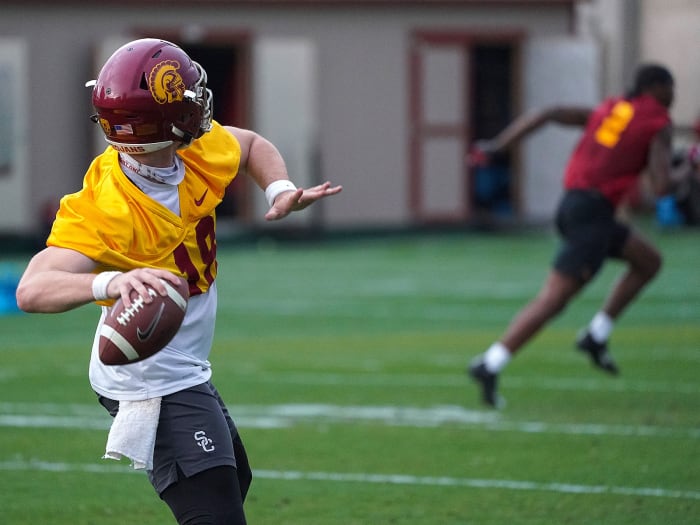
Trojans sophomore quarterback JT Daniels will be tasked with running Harrell's Air Raid offense this fall.
Scott Varley/MediaNews Group/Torrance Daily Breeze/Getty Images
USC begins camp on Friday, with 11 returning starters, a talented sophomore quarterback, an athletic group of receivers and a head coach on the hottest seat around who used the offseason to take a leap offensively. Helton is far from the only coach to overhaul an offensive approach in crunch time. In one of the more similar moves, Auburn coach Tommy Tuberville hired Tony Franklin in 2008 to install his own version of the Air Raid at a place that for years had played smashmouth football. It didn’t work, and Tuberville fired Franklin halfway through the season before getting fired himself. Others around the nation have done it successfully, like Gary Patterson at TCU in 2013, and even Alabama coach Nick Saban has warmed to the scheme. “They’ve become a lot more spread oriented with (quarterback) Tua (Tagovailoa),” Helton says. “At some point in time, you’ve got to have enough courage to make the change and not always say, ‘We’ve always done it this way.’”
Helton’s eggs are in Graham Harrell’s blender, and maybe that’s not so bad given the historical success of guys like him. Harrell is part of a trend in college football: star college players who after leaving pro ball accelerate up the coaching ladder. Jim Leonhard, a former Wisconsin safety who played a decade in the NFL, landed the job as the Badgers defensive coordinator in Year 2 of his coaching career in 2017. Kingsbury, the ex-Tech quarterback who played five years in the pros, became Texas A&M’s offensive coordinator in 2012, the fifth year of his coaching career. Now it’s Harrell, five years removed from almost starting his career on the plains of west Texas as a high school coordinator.
Harrell chuckles retelling that story. It was Mike Leach’s offensive line coach, Clay McGuire, who originally connected him with James Morton about the OC opening at Midland Lee High. “I’m driving back from the interview, the eight hour drive from Midland to Tyler, Texas, and Clay calls,” Harrell says. “I told him I’m probably going to take the job. On that same drive, Coach Leach called me. I guess Clay told Coach Leach that I was going to take this job and Leach told me, ‘If you’re going to coach, come work for me.’ I had to call Coach Morton back.”
Morton remembers that call. “He was like, ‘Something’s come up. Coach Leach called me and offered me the job,’” Morton says. “I joked with him and said, ‘Sounds like you’ve got a hard decision to me!’”

